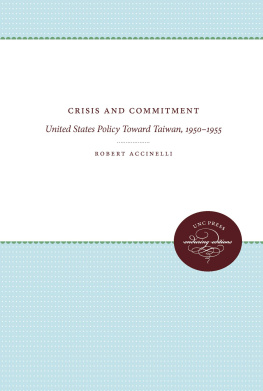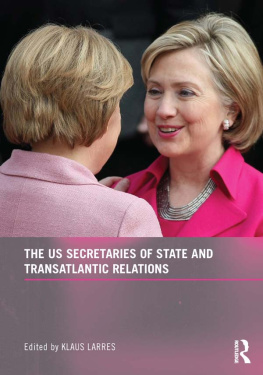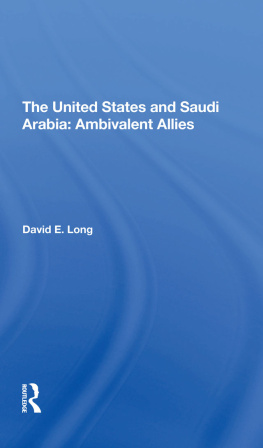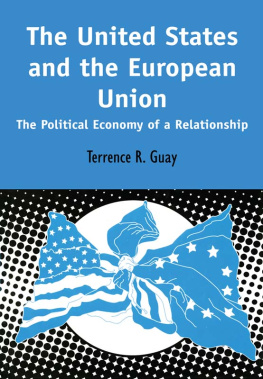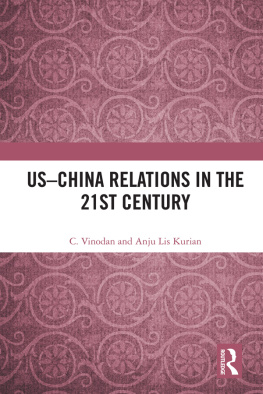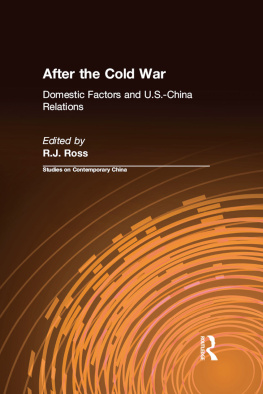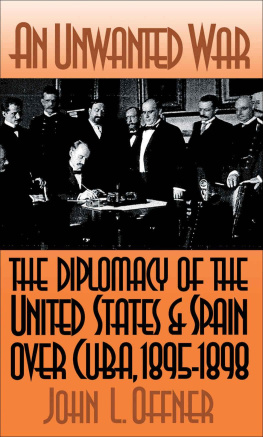Cover
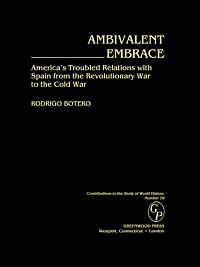
| title | : | Ambivalent Embrace : America's Troubled Relations With Spain From the Revolutionary War to the Cold War Contributions to the Study of World History, 0885-9159 ; No. 78 |
| author | : | Botero, Rodrigo. |
| publisher | : | Greenwood Publishing Group |
| isbn10 | asin | : | 0313315701 |
| print isbn13 | : | 9780313315701 |
| ebook isbn13 | : | 9780313001307 |
| language | : | English |
| subject | United States--Relations--Spain, Spain--Relations--United States. |
| publication date | : | 2001 |
| lcc | : | E183.8.S7B68 2001eb |
| ddc | : | 303.48/273046 |
| subject | : | United States--Relations--Spain, Spain--Relations--United States. |
Page i
AMBIVALENT EMBRACE
Page ii
Recent Titles in Contributions to the Study of World History
The Jacobean Union: A Reconsideration of British Civil Policies under the Early Stuarts
Andrew D. Nicholls
Irelands Children: Quality of Life, Stress, and Child Development in the Famine Era
Thomas E. Jordan
In Search of Woodrow Wilson: Beliefs and Behavior
Robert M. Saunders
Opposition Beyond the Waters Edge: Liberal Internationalists, Pacifists and Containment, 19451953
E. Timothy Smith
Ethnic Cleansing in the USSR, 19371949
J. Otto Pohl
Populist Nationalism: Republican Insurgency and American Foreign Policy Making, 19181925
Karen A. J. Miller
Uneasy Alliance: Relations Between Russia and Kazakhstan in the Post-Soviet Era, 19921997
Mikhail Alexandrov
The Maori and the Crown: An Indigenous Peoples Struggle for Self-Determination
Dora Alves
Shamanism and Christianity: Native Encounters with Russian Orthodox Missions in Siberia and Alaska, 18201917
Andrei A. Znamenski
Neville Chamberlain and British Rearmament: Pride, Prejudice, and Politics
John Ruggiero
Philanthropic Foundations in the Twentieth Century
Joseph C. Kigor
The Politically Correct Netherlands: Since the 1960s
Herman Vuijsje
Translated and annotated by Mark T. Hooker
Page iii
AMBIVALENT EMBRACE
Americas Troubled Relations with Spain from the Revolutionary War to the Cold War
RODRIGO BOTERO
Contributions to the Study of World History, Number 78

GREENWOOD PRESS
Westport, Connecticut London
Page iv
Library of Congress Cataloging-in-Publication Data
Botero, Rodrigo.
Ambivalent embrace : Americas troubled relations with Spain from the
Revolutionary War to the Cold War / by Rodrigo Botero.
p. cm.(Contributions to the study of world history, ISSN 08859159 ; no. 78)
Includes bibliographical references (p. ) and index.
ISBN 0-313-31570-1 (alk. paper)
1. United StatesRelationsSpain. 2. SpainRelationsUnited States. I. Title.
II. Series.
E183.8.S7B68 2001
303.48'273046dc21 00035356
British Library Cataloguing in Publication Data is available.
Copyright 2001 by Rodrigo Botero
All rights reserved. No portion of this book may be reproduced, by any process or technique, without the express written consent of the publisher.
Library of Congress Catalog Card Number: 00035356
ISBN: 0-313-31570-1
ISSN: 08859159
First published in 2001
Greenwood Press, 88 Post Road West, Westport, CT 06881
An imprint of Greenwood Publishing Group, Inc.
www.greenwood.com
Printed in the United States of America

The paper used in this book complies with the Permanent Paper Standard issued by the National Information Standards Organization (Z39.481984).
10 9 8 7 6 5 4 3 2 1
Page v
For Louise
and, In Memoriam
Jaime Botero Londoo
Fabiola Montoya de Botero
Page vi
This page intentionally left blank.
Page vii
Contents
| 1 Cobelligerents, but Not Allies | |
| 3 Cultural Relations and Conflict over Cuba | |
| 4 An Empire Lost, an Empire Gained | |
| 5 Dictatorship and Ostracism | |
| 6 Reconciliation and Quasi Alliance | |
Page viii
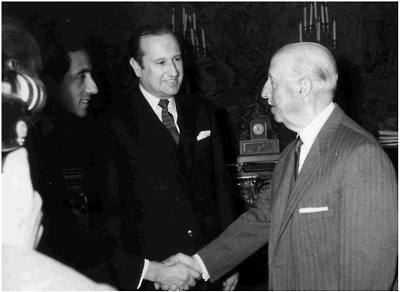
The author shaking hands with Francisco Franco. At center is Misael Pastrana, Ambassador to Washington at the time, later President (19701974).
Page ix
Introduction
Significant differences in the historical trajectories of Spain and the United States have shaped the peculiar character of their bilateral relations for two centuries. From the start of the North American Revolutionary War in the 1770s, until the consolidation of constitutional democracy in post-Franco Spain during the 1970s, the pattern of relations between Spain and the United States could be described as consisting of long periods of disinterest and estrangement, interrupted by short bursts of mutual interaction, usually of an adversarial nature. It is only in the last two decades that the bilateral relationship has come to resemble the prevailing norm between advanced Western democratic societies, which is one of close ties and friendly cooperation in the economic, political, cultural, and military spheres.
Spain has been a leading protagonist of worldhistorical events on three occasions: first and foremost, during the ascendancy of the Hapsburgs, when an American colonial empire was established; in modern times during the struggle against the Napoleonic invasion, and again during the Spanish civil war of 19361939. For the United States, the Revolutionary War, the adoption of the Constitution, the expansion to continental dimensions and the Civil War were events of worldhistorical significance, as was its emergence as a major industrial and military power at the end of the nineteenth century. During several of these stages the colonial interests of Spain came into conflict with the interests
Page x
of the United States as an expanding power. In the process of territorial expansion and consolidation of its role as the preeminent power in the Western Hemisphere, policy makers in the United States regarded Spain as a rival and an obstacle to the fulfillment of the national destiny. Likewise, Spanish officials regarded the emergence of a sovereign nation in North America as a potential threat to the metropolitan trade monopoly, and eventually to the security of the Spanish American colonies.
Next page


